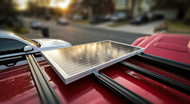TOP SEVEN MISTAKES PEOPLE MAKE WHEN GOING SOLAR (I)
2nd Nov 2021
Mistake number one : Confusing off-grid and grid-tied solar

Solar power allows you to generate your own energy which means you won't pay for power from the utility grid. People assume this means they will be going off the grid, but that's not entirely true. Most people often are geared towards a grid-tied solar system and here's the reason why.
Solar panels generate energy, but they need a way to store that energy for later use. If you have access to power lines, you can store the energy generated from the panels in the utility grid, allowing access to the utility companies, who will credit you for the extra power. In this scenario, your solar system is producing the energy and you’re simply pulling the energy you need from the grid. An off-grid application on the other hand, doesn't have access to power lines, which means that you need another standalone method to store energy.
This is where batteries come in. Batteries can be expensive but with no other option to store power in the grid, they're essential for off-grid solar systems. The bottom line is that, saving money and being independent from the grid are mutually exclusive when it comes to solar batteries as they can be pricey and an investment. Grid-tied installations don't need batteries, seeing as they’re directly connected to the utility company via power lines. If your residence has access to power lines, a grid-tied solar setup is going to be the most cost-effective solution for you. So why pay for batteries when the utility grid will take care of the storage for you.

Mistake number two: designingyour system incorrectly
If you're just starting out with your research, you might think it's as simple as looking at your latest energy bill then buying enough panels to cover that usage. The common error is neglection to account for factors like climate, panel orientation, shady natural efficiency drops and other things that impact the true output of your system.
That's why we recommend that you consult with an experienced solar technician before investing in your solar system.
Compiled below are some of things you should talk about with your solar technician.
First, efficiency: solar panel efficiency drops about 1% every year. It's a good idea to design a system with a little extra power to account for the 10 to 20 percent decrease that happens over the course of 20 years. In most cases this is an extra panel or two.
Second, weather and location. Solar panels are tested in ideal weather conditions, but in the real world your system can be exposed to much harsher environments. High temperatures can reduce the amount of energy your panels generate. Your location also dictates how many sun hours you get. Sun hours refers to the amount of time that the Sun is in the right position to generate peak energy. Most places get about four to six hours per day and the exact amount depends on the overall size of your solar system.
Third, voltage. Your system needs to be designed at the right voltage based on the equipment being use and it’s requirements. It’s important to also account for things like temperature which can affect voltage and system performance. For example, if you don't have the right voltage from your solar panels or battery bank, your system might not perform well or worse you could damage the entire setup and hardware.
And finally: mismatching battery bank size. Your battery bank with the charging source is the most common issue. When it comes to batteries specifically with off-grid systems, sizing your setup needs to supply enough power to keep the batteries charged, but not so much that they overcharge your batteries, and on the contrary, undercharge, which can equally ruin your batteries.
Mistakenumber three: not taking intoconsideration power outages
You're generating your own energy, so the light should stay on during a power outage, right? Unfortunately, with grid-tied systems, that's not the case. Although the power originates from your panels, it's still stored in the public utility grid, so when the grid power goes out, as does yours. This keeps utility workers safe from energy being produced from your solar array. The remedy for this is a grid-tied system with a battery backup. When the power is on, it functions like a normal grid- tied system. However, during an outage, a small backup battery bank kicks in to keep the lights on. It costs a little bit more, but the peace of mind is invaluable. Especially if you live somewhere with extreme weather conditions, unreliable utility power or if you have critical appliances that need to stay on 24/7.

Mistake number four:not buying solar because you think it'sa bad investment
Although solar can be pricey, it's certainly a worthwhile investment. It can be a big commitment, however electricity from your power company isn't cheap and is bound to steadily increase in price overtime. The reality is, when you look at a long-term value of owning a solar system, most grid-tied systems pay for themselves quickly and actually end up making you a profit over the life of the warranty.
Here's how you calculate: when you start profiting from solar, take your total system costs and subtract it from the federal tax credit, and divide that by your yearly electricity cost. After your payback period, you're saving money year after year because you're not paying the utility company anymore. That sounds pretty good right? You may also be eligible for state and local tax credits or rebates that help you reduce the net cost of your system for even more savings.

